
Resources
Browse our full library of in-depth resources and publications
The PacWastePlus programme team is committed to producing meaningful and valuable publications and resources that provides guidance for improving waste management in the Pacific
Search
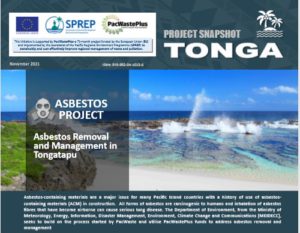
Factsheet
Tonga Project Profile – Asbestos Removal and Management in Tongatapu
Asbestos-containing materials are a major issue for many Pacific Island countries with a history of use of asbestos-containing materials (ACM) in construction. All forms of asbestos are carcinogenic to humans and inhalation of asbestos fibres that have become airborne can cause serious lung disease. The Department of Environment, from the Ministry of Meteorology, Energy, Information, Disaster Management, Environment, Climate Change and Communications (MEIDECC), seeks to build on the process started by PacWaste and utilise PacWastePlus funds to address asbestos removal and management
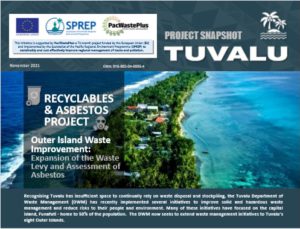
Factsheet
Tuvalu Project Profile – Outer Island Waste Improvement: Expansion of the Waste Levy and Assessment of Asbestos
Recognising Tuvalu has insufficient space to continually rely on waste disposal and stockpiling, the Tuvalu Department of Waste Management (DWM) has recently implemented several initiatives to improve solid and hazardous waste management and reduce risks to their people and environment. Many of these initiatives have focused on the capital island, Funafuti - home to 50% of the population. The DWM now seeks to extend waste management initiatives to Tuvalu’s eight Outer Islands.
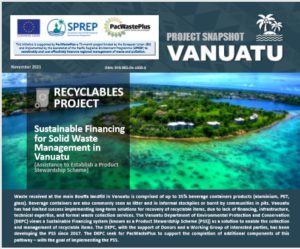
Factsheet
Vanuatu Project Profile – Sustainable Financing for Solid Waste Management in Vanuatu: Assistance to Establish a Product Stewardship Scheme
Waste received at the main Bouffa landfill in Vanuatu is comprised of up to 35% of beverage containers products (aluminium, PET, glass). Beverage containers are also commonly seen as litter and in informal stockpiles or burnt by communities in pits. Vanuatu has had limited success implementing long-term solutions for recovery of recyclable items, due to lack of financing, infrastructure, technical expertise, and formal waste collection services. The Vanuatu Department of Environmental Protection and Conservation (DEPC) views a Sustainable Financing system (known as a Product Stewardship Scheme (PSS)) as a solution to enable the collection and management of recyclable items. The DEPC, with the support of Donors and a Working Group of interested parties, has been developing the PSS since 2017. The DEPC seeks for PacWastePlus to support the completion of additional components of this pathway – with the goal of implementing the PSS.
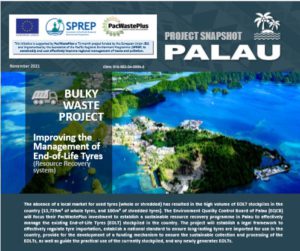
Factsheet
Palau Project Profile – Improving the Management of End-of-Life Tyres: Resource Recovery system
The absence of a local market for used tyres (whole or shredded) has resulted in the high volume of EOLT stockpiles in the country (13,739m³ of whole tyres, and 100m³ of shredded tyres). The Environment Quality Control Board of Palau (EQCB) will focus their PacWastePlus investment to establish a sustainable resource recovery programme in Palau to effectively manage the existing End-of-Life Tyres (EOLT) stockpiled in the country. The project will establish a legal framework to effectively regulate tyre importation, establish a national standard to ensure long-lasting tyres are imported for use in the country, provide for the development of a funding mechanism to ensure the sustainable collection and processing of the EOLTs, as well as guide the practical use of the currently stockpiled, and any newly generates EOLTs.
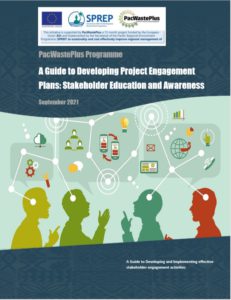
Regional
A Guide to Developing Project Engagement Plans: Stakeholder Education and Awareness
This guiding document aims to assist the development and implementation of meaningful actions to support project engagement through focused education, awareness, cost-effectiveness, sharing of ideas, and make the most effective use of the resources available.
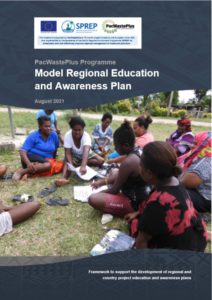
Regional
Model Regional Education and Awareness Plan
This Model Regional Education and Awareness Plan (REAP) provides an overarching approach, that can be referenced in PacWastePlus country project National Education and Awareness Plans (NEAP) to support the implementation of the PacWastePlus programme throughout the region. The model REAP is designed for anyone who leads, creates, or manages waste-oriented projects and programs to engage and communicate with a broad range of stakeholders in the Pacific Region.
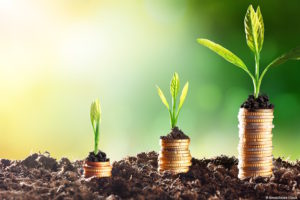
Factsheet
Pathway for a Sustainable Financing Mechanism
The development of a sustainable financing mechanism to assist with funding the sound management of wastes is an opportunity for countries and territories to explore, especially given the current level of donor support on waste management.
The proposed pathway for sustainable financing mechanism outlines 21 priority steps around the topics of:
i) identification of the need for legislation
ii) research
iii) political will and support
iv) preliminary systems concept
v) feasibility study
vi) consultation
vii) confirmation of sustainable finance system design
viii) legal drafting
ix) implementation
x) monitoring, evaluation, and auditing.
It is envisaged that the Secretariat will assist Members to implement as well as coordinate this Pathway through the Cleaner Pacific 2025 and capitalising on current donor-funded projects such as the PacWastePlus programme, GEF ISLANDS, SWAP and JPRISM II as well as any new projects that would be mobilised as part of the proposed pathway
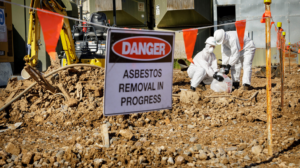
Factsheet
Asbestos Management Legislative Reform Pathway
PacWastePlus has developed an Asbestos Management Legislative Reform Pathway that clearly identifies the steps necessary to institute bans on asbestos. This Pathway utilises and summaries the various work undertaken such as an analysis of legislative options for the management of asbestos, development of a guidance note/brief on the issues, and a Policy Note to guide the drafting of National legislation to impose a ban on the importation of asbestos. The development of these resources is in direct response to the outcomes of previous SPREP Meetings requesting specific assistance to manage asbestos and ban its importation to the region.
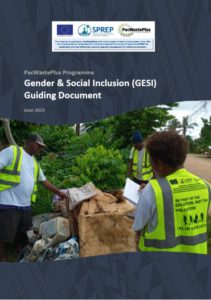
Programme Governance Document
PacWastePlus Programme Gender & Social Inclusion (GESI) Guiding Document
Given the significantly gendered nature of social life in Pacific Island countries, and related inequalities, the successful achievement of Regional and Country Projects will require the PacWastePlus team to give attention to the different needs, interests, priorities and roles of women, girls, men and boys and the relations between them. Similarly, given that people living with disabilities are overall the most socially excluded group, the specific needs, interests and priorities of people living with disabilities are fundamental to achieving inclusive development results.
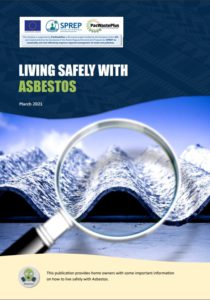
Booklet
Living Safely with Asbestos
The management and disposal of asbestos-containing materials are currently a cause of concern in the Pacific region. In seeking to improve the ways that asbestos and asbestos-containing materials are managed in
PacWastePlus countries, the focus is to prevent exposure to asbestos fibres in order the eliminate asbestos-related diseases. Asbestos is a known health hazard and may be present in your home, but it may not be a risk, depending on its condition. In this publication, we provide useful information on how to live safely with asbestos.
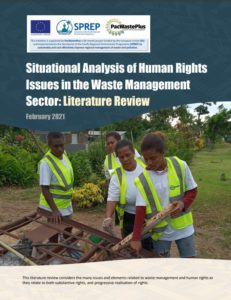
Technical Report
Situational Analysis of Human Rights Issues in the Waste Management Sector: Literature Review
A literature review was undertaken to gain a comprehensive understanding of waste management and the related issues and good practices and a general understanding of the realisation of the human rights implicated in relation to waste management in PacWastePlus programme participating countries. Armed with this basis of the information, the researcher seeks to draw linkages between waste management and human rights and the related issues in the Pacific Island Countries of focus and to gain a comprehensive understanding of how issues of human rights, equality, and cultural awareness are currently being considered and incorporated into waste and environmental programme management.
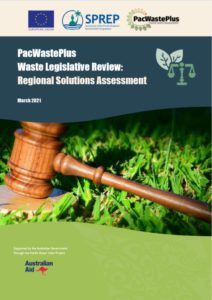
Waste Legislative Review
Waste Legislative Review: Regional Solutions Assessment PacWastePlus
Several options for regionally led approaches to address the gaps and opportunities for a regional legislative framework are identified in the report, including the development of technical guidance, model laws, and compliance/enforcement training to build a foundation of skills, knowledge, and capacity for waste governance across the region. This report considers the relevant requirements applying to waste management under international and regional conventions and non-binding ‘soft law’ instruments, their alignment to the needs of the PacWastePlus participating countries, and common gaps and challenges that arise that might be the basis for developing regionally harmonised approaches. Several options for regionally led approaches to address the gaps and opportunities for a regional legislative framework are identified in the report, including the development of technical guidance, model laws, and compliance/enforcement training to build a foundation of skills, knowledge, and capacity for waste governance.
File Size: 2.4MB, 34 pages PDF document
Newsletter Subscription
Would you like to subscribe to our quarterly programme newsletter-The Connection?
We care about the protection of your data. Read our Privacy Policy.
Newsletter Signup
To sign up to our newsletter, enter the information below and we will add you to our mailing list for all future regional and project updates.
